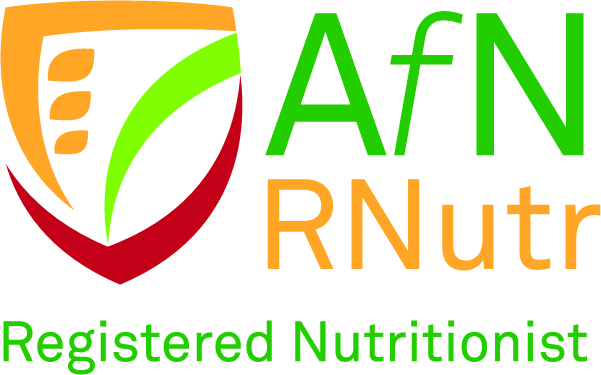Can our diet support our immune system?
With coughs and colds seemingly part and parcel of the winter months, there’s no wonder many of us seek out quick fixes which claim to ‘boost’ our immune system. Unfortunately, there are no miracle nutrients or foods which can achieve this, but the good news is that there are ways we can support our immune system through what we eat.
Whilst here we’ll focus on how you can optimise your diet to support your immune system, it’s important to remember that other lifestyle factors such as sleep quality, stress, exercise, alcohol consumption and smoking habits, also have a part to play. And other factors, such as our age, gender, muscle mass, vaccination status and socioeconomic status will also have an impact on the efficiency of our immune response.
First, a quick guide to the immune system
The immune system is a catch-all term to describe the body’s defence mechanisms against disease and infection. It consists of two main parts which work together to protect our health; the innate immune system which includes initial responders (acting like ‘paramedics’) to quickly tackle pathogens, such as physical barriers like our skin and gut lining, biochemical barriers such as our stomach acid as well as multiple white blood cells which whip into action immediately; the adaptive immune system involves immune cells which are recruited over time and provides a more specialist, targeted response. This complex system requires a wide range of nutrients to keep it in tip-top shape.
Which nutrients are important?
So, are there specific nutrients we should be seeking out to support our immune system during the colder months?
The truth is that a poor diet can reduce the health and efficiency of our immune system, leading to increased risk of infection (1).
Our immune system is complex and requires adequate energy, protein, several fatty acids, and numerous micronutrients to function at its best. Maintaining a healthy microbiome is also essential. In general, most of us here in the UK get adequate amounts of energy and protein across our diet. But we can fall short with our intakes of essential fatty acids, certain micronutrients and in looking after our gut health.
There are many different micronutrients involved. Vitamins A, C, D, E, B2, B6 and B12 as well as folic acid (B9), iron, selenium and zinc are all essential for the maintenance of our immune machinery (1).
A varied diet is key
With so many different vitamins and minerals playing key roles, it makes sense that the best approach is to aim for variety and balance and, essentially to follow the principles of the Eat Well Guide – in aiming for at least 5 fruit and vegetables a-day, choosing a high fibre diet with plenty of wholegrains, limiting intakes of free sugar, saturated fat and salt and including lean protein such as chicken, fish and pulses, as well as some healthy unsaturated fats found in nuts, oily fish and olive oil.
Although the efficiency of our immune system varies according to our life stage, throughout our lives we need to gain adequate amounts of these immunity-supporting micronutrients.
Restoring micronutrient deficiencies
Restoring deficiencies in any of these essential micronutrients will improve your resistance to infection and help enable faster recovery if you get infected (1). Of course, depending on our personal dietary preferences, age and general health status, our likelihood of deficiency in a certain nutrient will vary.
In the UK, we are generally not affected by severe micronutrient deficiencies. However, mild nutritional deficiencies are common, and some are more typical than others, particularly for those who follow restricted diets or exclude whole food groups.
Here, we’ll focus on those nutrients which are both key to the immune system and more often lacking in our diets. These include Vitamin D, folic acid, selenium, iron and zinc.
A quick note on units
You will usually see vitamins and minerals expressed as the following 3 units:
mg – which is a milligram – 1 thousandth of a gram
μg or mcg – which is a microgram and is 1 millionth of a gram
IU – which stands for International Units. This is sometimes used for vitamins A, D and E.
Nutrients which support the immune system
Vitamin D
Amongst other key roles (such as enabling us to absorb the calcium from our food), Vitamin D plays a central role in immune system function, yet the exact mechanisms are still being defined (2).
Which foods contain Vitamin D?
Vitamin D is found in foods such as oily fish, cod liver oil, milk, eggs, meat, butter and fortified breakfast cereals. However, for most of us, we can’t get enough Vitamin D through our diet, and exposure to summer sunlight is needed to convert the Vitamin D under our skin into its usable form.
So, during winter, many of us become deficient due to lack of sunshine, which is why the NHS advises everyone over the age of 1 year to take a daily Vitamin D supplement of 10µg (400IU) to avoid deficiency, from September through to March. Those who keep their skin well-covered or those who spend most of their time indoors, such as older adults in care homes or those in hospital, should consider supplementing all year round (2).
Due to darker skin types, those of African Caribbean, African and South Asian ethnicity may be at greater risk of Vitamin D deficiency due to a reduced capacity to synthesise Vitamin D from sunlight and may also benefit from year round supplementation (3).
Sensible supplementation
Taking too much Vitamin D over a long time causes a build-up of calcium which can damage the kidneys and heart and cause weak bones. Ideally, take the recommended daily 10µg (400 IU) supplement, but it’s crucial not to exceed 40µg/day (4000IU), which is the upper safe limit.
Recipe Inspo
Try my Veggie Quiche containing eggs, yogurt and cheese – all foods providing Vitamin D.
Veggie Quiche – The Nutrition Consultant
Folate
Folate, also known as folic acid or Vitamin B9, is essential in the production of our red and white blood cells. Our white blood cells act as our immune system’s army, there are many types, all with different roles in fighting off pathogens throughout the body. So, it’s important that we get enough folate through our diet to keep our immune system working well. Many of us in the UK are mildly deficient in folate, so we could all benefit from eating more folate-rich foods (4).
Which foods contain folate?
Food sources include green vegetables such as broccoli, peas, brussels sprouts and leafy variants such as cabbage and spinach as well as oranges, brown rice, chickpeas, kidney beans, liver and some fortified cereals. However, liver should be avoided during pregnancy due to its high Vitamin A content (see Vitamin A).
The use of folate in the body depends on adequate levels of Vitamin C, B12. andB6 so it’s important to eat a varied diet to gain these nutrients also.
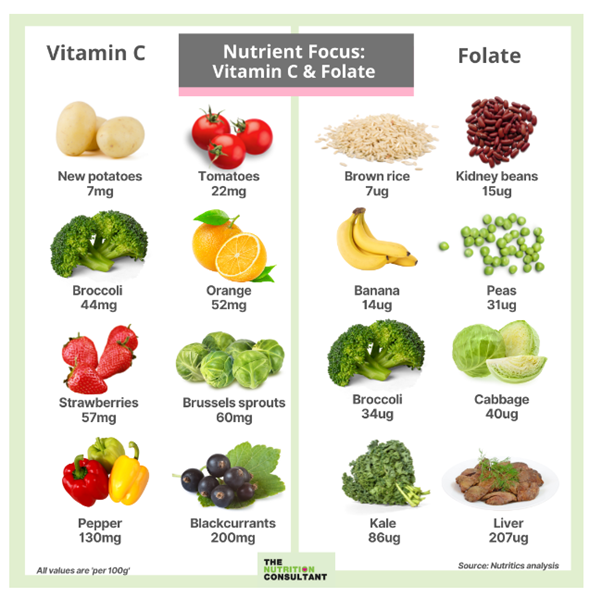
How much folate do we need?
Most adults (and children over 11 years) need around 200µg per day and can achieve this through a varied balanced diet, but women who are trying for a baby or are pregnant should take a supplement of 400µg folic acid until 12 weeks pregnant (unless advised differently by your GP or health visitor – some people require more), as well as eating a diet containing folate rich foods. This is because adequate folate status also reduces the risk of birth defects (such as spina bifida) in unborn babies. When breast-feeding, mothers need 260µg per day and may require a supplement to achieve this (5).
Older adults and those with coeliac or Crohn’s disease may be at increased risk of deficiency and may benefit from supplementing and should consult with a dietitian to determine dosage.
Recipe Inspo
Try my Tofu, Chickpea and Cashew Curry
Tofu, Chickpea & Cashew Cream Curry – The Nutrition Consultant
Selenium
One of selenium’s main roles is acting as a powerful antioxidant in protecting the body’s cells against damage from oxidative stress and preventing viral multiplication.
Various studies have shown that inadequate selenium status is associated with worse health outcomes to several viruses including Covid 19 (6, 7). Ensuring we get enough selenium in our diet is key to fighting infection and may be helpful in tackling the inflammatory effects of viruses like Covid 19 (8, 9). In those deficient in selenium, low dose daily supplementation has been found to stimulate the immune system (10).
How much selenium do we need every day?
The daily reference nutrient intakes (RNIs) in the UK are 60µg for women and 75µg for men. Most people in the UK are mildly deficient in selenium, so could benefit from eating more selenium containing foods.
Which foods contain selenium?
In the UK, we gain most of our selenium through meat and fish and some from breads and cereals also. As many of us don’t eat the recommended amount of fish and oily fish, this would be a great way to boost our selenium status, whilst also benefiting from their many other nutritional qualities, such as being a source of essential fatty acids, key for both immune and heart health and iodine, which helps support healthy thyroid function.
Brazil nuts are a very rich source of selenium (68–91 mcg per nut!), but eating too many, too often could cause selenium toxicity (11). However, 2 or 3 Brazil nuts eaten weekly could help to improve status in those at risk of deficiency.
Who are most at risk of deficiency?
Due to the main UK selenium sources being meat and fish, those following plant-based diets may be at a greater risk of deficiency. Also, those with smaller appetites such as older adults could be at risk of sub-optimal intakes.
Should we supplement?
It’s important to note that having too much selenium consistently can be dangerous and result in brittle nails and hair, skin lesions and garlic smelling breath, as well as increase long-term disease risk.
Ideally, it’s best to achieve optimum selenium status through whole foods in the diet, rather than supplementing.
If you’re concerned about your selenium status because you eat very little meat, fish or bread, a 100µg daily supplement could optimise status and support your immune system, fertility, thyroid function and protect against cognitive decline and cancer (12). Taking 350μg or less a day of selenium supplements is unlikely to cause any harm, but unless medically advised, it’s important to not go beyond this.
Recipe Inspo
Try my Family Fish Pie Family Fish Pie – The Nutrition Consultant
Iron
Iron plays an important role in maintaining a healthy immune system, as well as a key role in making healthy red blood cells, to carry oxygen around our bodies.
How much iron do we need every day?
Men, and women over 50 years of age need 8.7mg iron per day, whereas girls 11yrs and above and women under 50 need more – 14.8mg/day. Boys aged 11-18yrs need 11.3 mg/day.
Which foods contain iron?
Iron-rich foods include red meat, tuna and chicken. The best plant-based sources include beans and pulses, tofu, spinach and fortified cereals. Iron found in animal-based foods is better absorbed by the body than that found in plant-based foods. This simply means that those following plant-based diets need to make sure they eat a variety of iron-containing foods every day.
Take a look at the infographics below for how you can increase absorption of iron; which foods are good sources of iron and how much we need through the life stages.
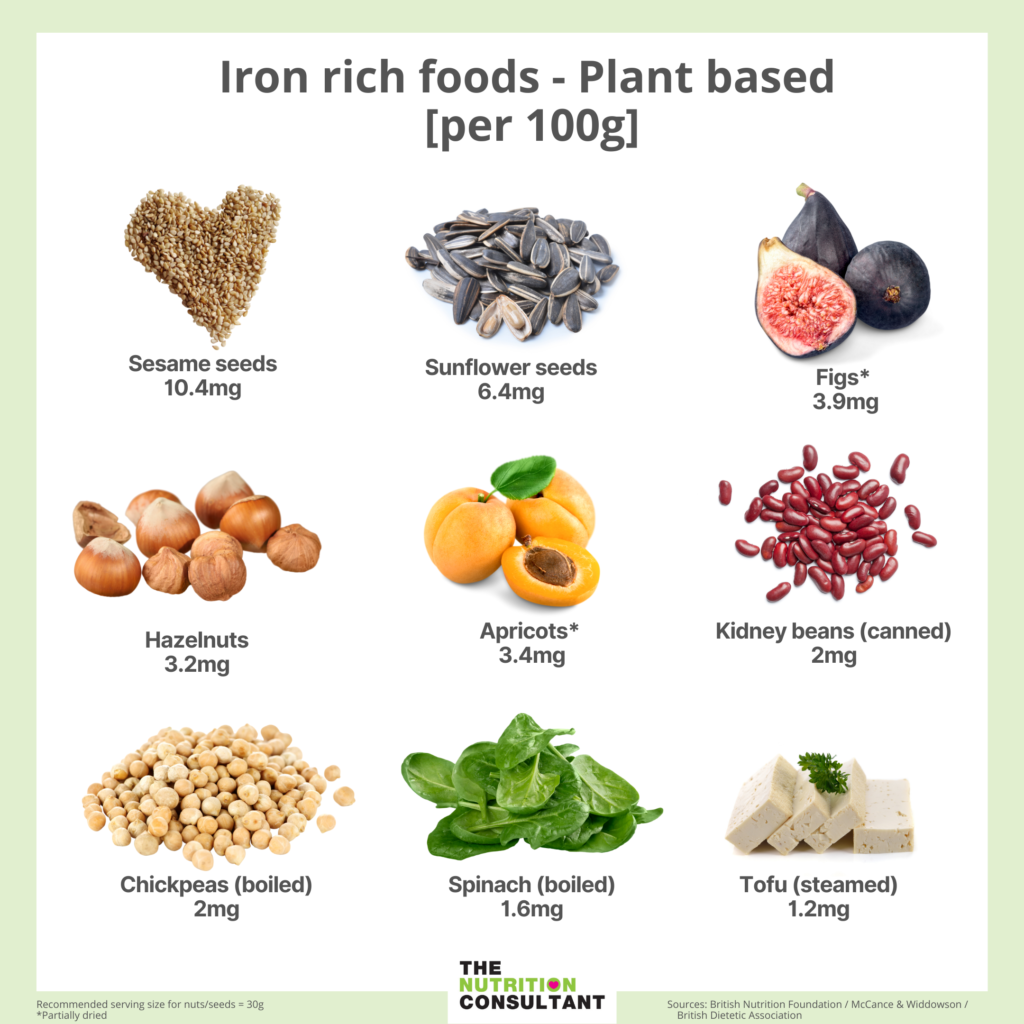
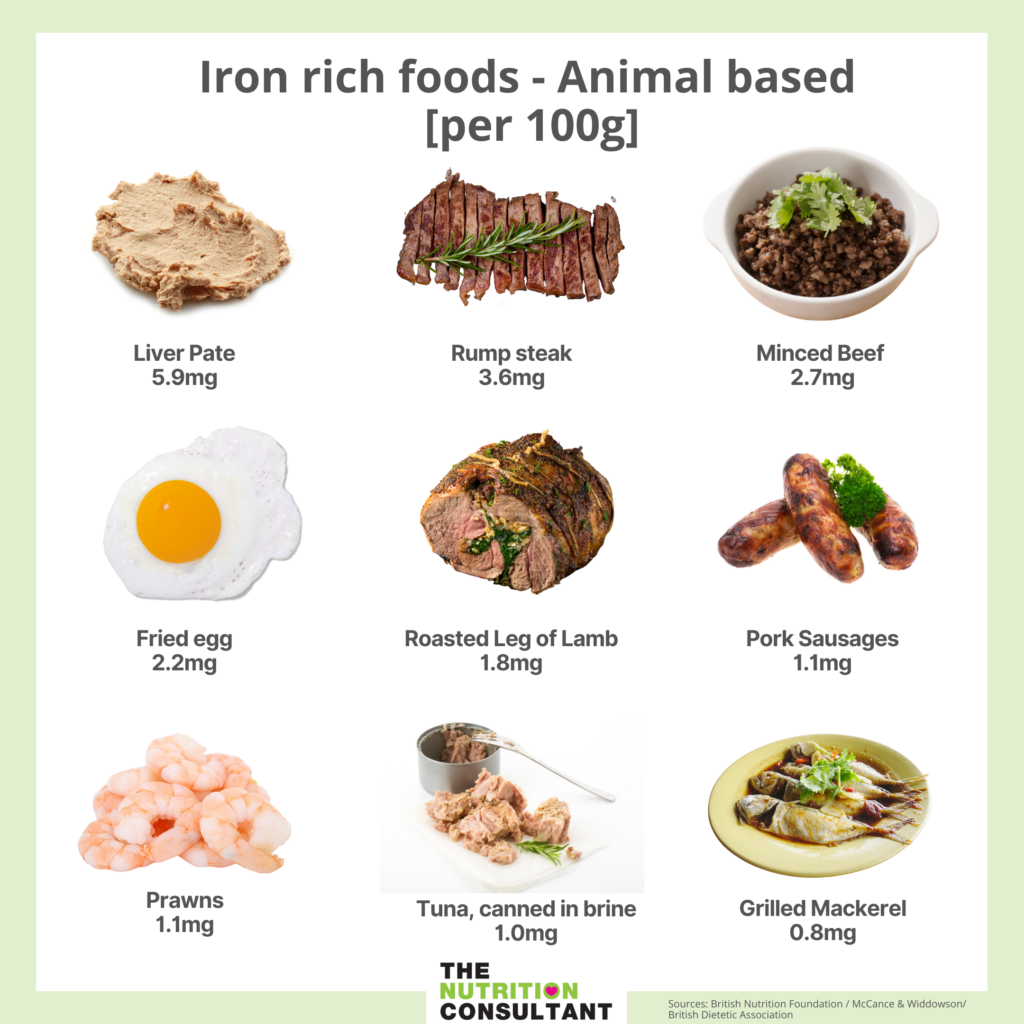
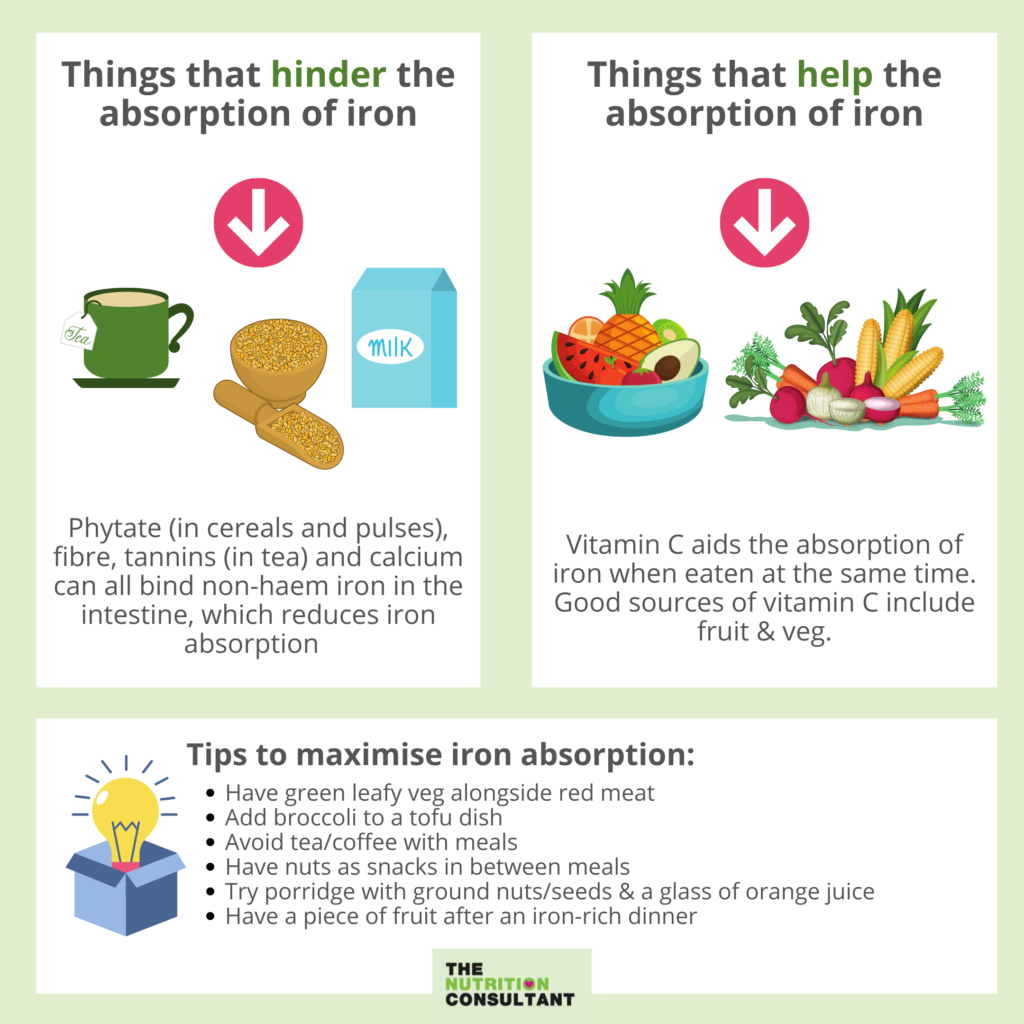
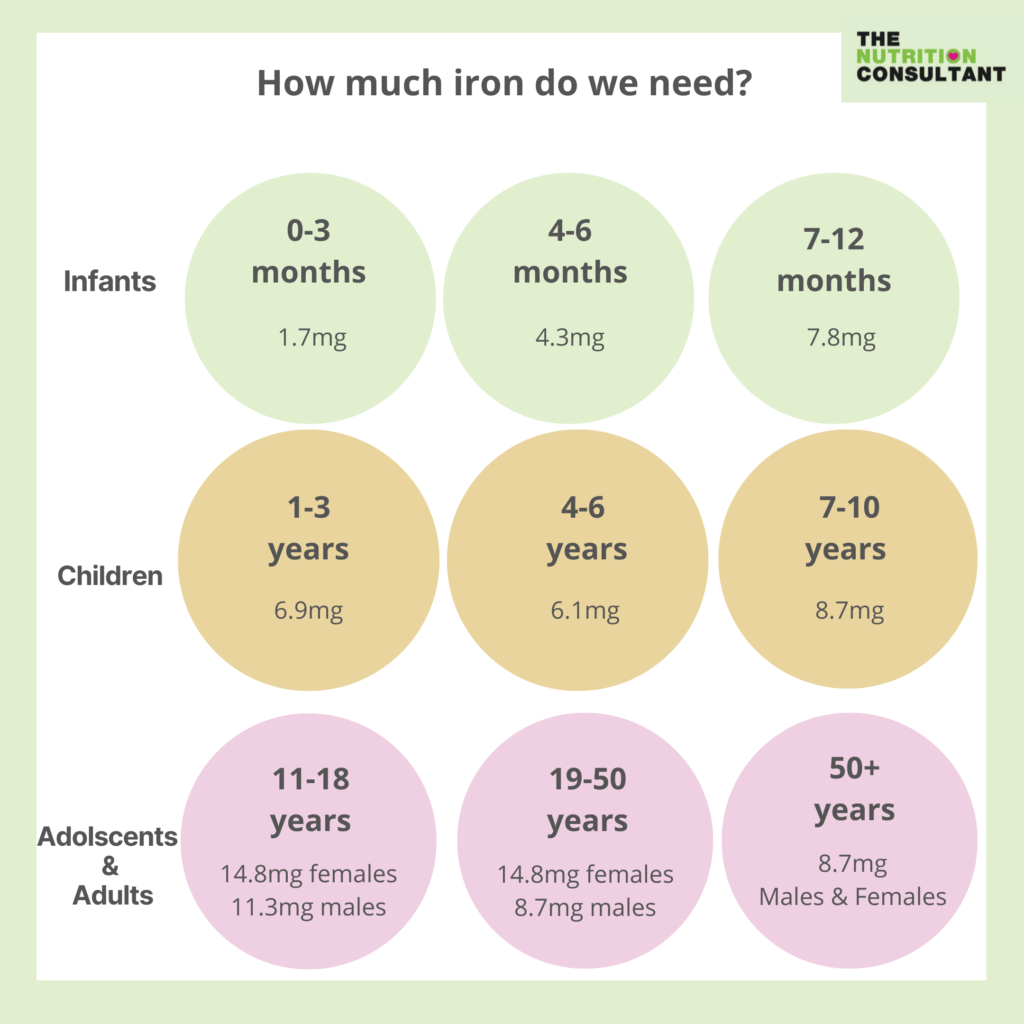
Who are most at risk of deficiency?
Women and teenage girls with heavy periods and those with digestive conditions which cause blood loss are at risk of being iron-deficient. Pregnant women are also at risk due to the increased iron required to support the baby’s growth. Vegetarians, vegans and those following a low red meat diet are also at risk of deficiency.
Should we supplement?
If you’re feeling especially tired, or experiencing shortness of breath, fast heartbeat, mouth ulcers, thinning hair or itchy skin you might be deficient in iron, which causes iron-deficiency anaemia. It’s best to book and appointment with your GP to check. If you’re anaemic, your doctor will prescribe a supplement.
Recipe Inspo
Try my Bolognese Bake Bolognese Bake – The Nutrition Consultant
Zinc
Zinc is used for many processes in the body including releasing energy from food, tissue growth, functioning of the immune system, wound healing, and for normal reproductive development.
So how much zinc do we need every day?
Adults need around 9.5mg per day (men) and 7mg per day (women). Vegetarians and vegans require more because plant-based sources of zinc (such as nuts and seeds) are not as readily absorbed by the body.
Which foods contain zinc?
Meat is the greatest source of zinc as it is most readily absorbed, however, zinc is also present in milk, cheese, eggs, shellfish, wholegrain cereals, nuts and pulses. However, due to the high phytic acid content of nuts, seeds and grains, these foods are not good sources of zinc. The best plant-based sources of zinc include Quorn (7g per 100g serving), with tofu, wholemeal bread, peanut butter and cashew nuts providing 1-2 mg per serving (13).
Who are most at risk of deficiency?
Meat is the best source of zinc due to the absence of phytate, so vegetarians or those avoiding red meat and fish may be at risk of zinc deficiency. Data suggests that children and teenagers in the UK are at risk of low intakes (4).
Should we supplement?
Unless you are in an at-risk group, you should be able to get enough zinc from a varied balanced diet.
Keep in mind that if you take a supplement, keep dosage similar to daily requirements, because higher doses of zinc can reduce absorption of copper which can lead to anaemia and bone weakening.
Recipe Inspo
Try my Chicken and Vegetable Traybake
Chicken & Vegetable Traybake – The Nutrition Consultant
Should I take a supplement to support my immune system?
In general, supplements only improve immune function if there is a micronutrient deficiency in the first place. In the UK most of us can gain all the nutrients we need to support our immune health from a healthy balanced diet. The only exception is Vitamin D, which cannot be gained in sufficient amounts during the winter, so a 10µg daily supplement is advised for all aged over 1 year from September through to March. That being said, there are certain life stages and circumstances when supplementation is recommended to avoid deficiency.
Children aged 6 months- 5 years are also advised to take Vitamins A and C alongside their Vitamin D.
Pregnant women and those planning to conceive should take a 400µg folic acid supplement, until they are 12 weeks pregnant.
Vegans, vegetarians, older adults and those with medical conditions
If you’re at risk of a micronutrient deficiency because you exclude whole food groups or have a medical condition which affects your absorption of nutrients or reduces your appetite, you may want to consult a Registered Dietitian.
There might be some other circumstances when taking a supplement is necessary – so please consult your doctor or a dietitian if you are unsure.
Keep an eye on dosage
It’s important not to overconsume supplements and to stick to recommended dosage, because having too much of a single nutrient could have a negative impact on your health.
What about supporting my gut health?
Our gut is home to 70-80% of our immune system cells, so it follows that improving our gut health may be key to strengthening our immune function (14). If we can encourage a healthy, balanced gut microbiota through our diet and lifestyle, this is associated with a growing number of positive health outcomes, not only for our immune function but for our metabolic, digestive and brain function too.
How can we achieve a healthy gut microbiome?
There are two main ways to help restore microbial balance in our gut – i) by consuming probiotics (good bacteria) and ii) and by consuming prebiotics (food for the good bacteria to enable them to thrive).
The way in which these good bacteria benefit our immune system function is by producing beneficial metabolites, competing with pathogens, strengthening our gut wall (preventing infection and inflammation) and also stimulating an immune response (15-17).
Which foods contain probiotics?
Microbes have to fulfil certain criteria to be classified as a probiotic. They have to:
1️⃣ Be alive
2️⃣ Be present in large numbers
3️⃣ Have evidence of a health benefit
The most commonly known probiotic foods are live yogurt and cultured dairy products like kefir. Check out the infographics for a selection of other foods that contain probiotics. Be mindful that there is a significant difference between pharmaceutical-grade probiotics that show promise in clinical trials and those found in drinks and yoghurts etc. More high-quality human studies are needed to support health claims for many probiotic foods.
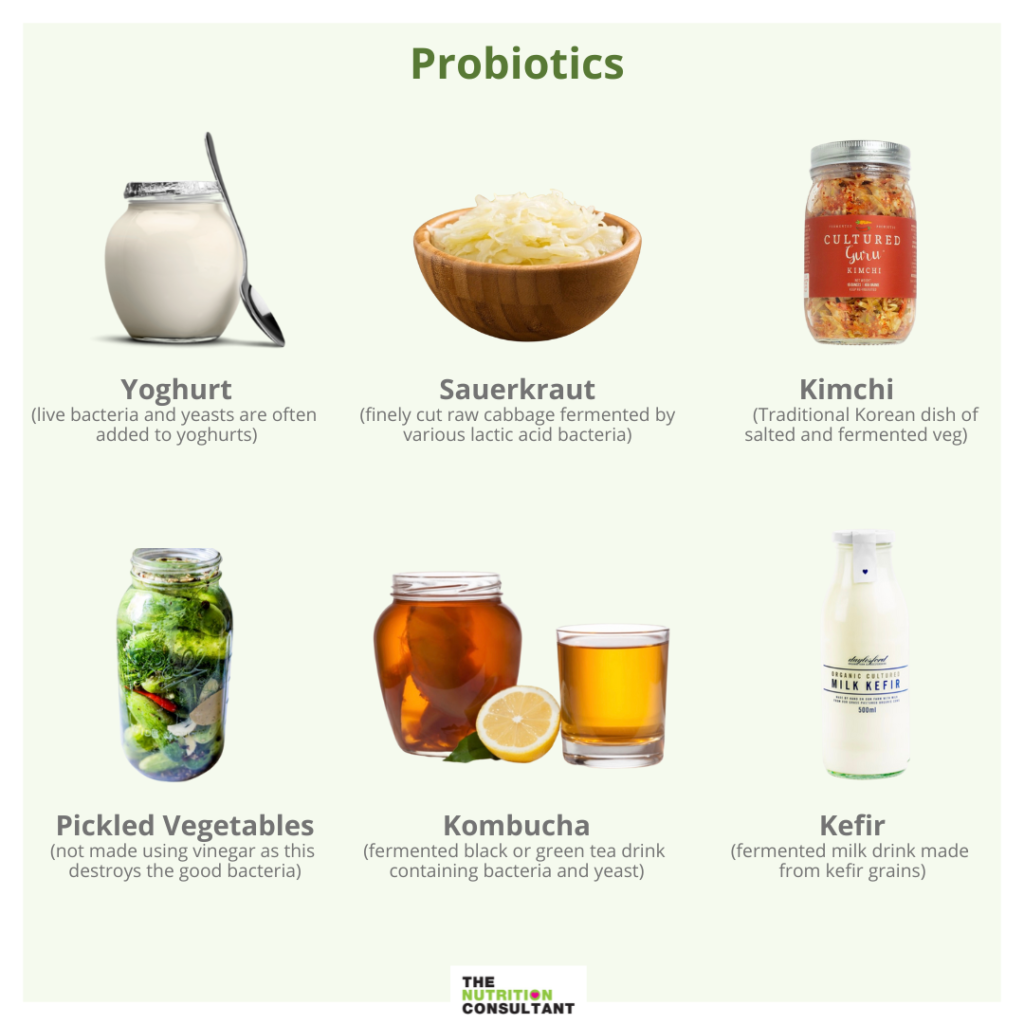
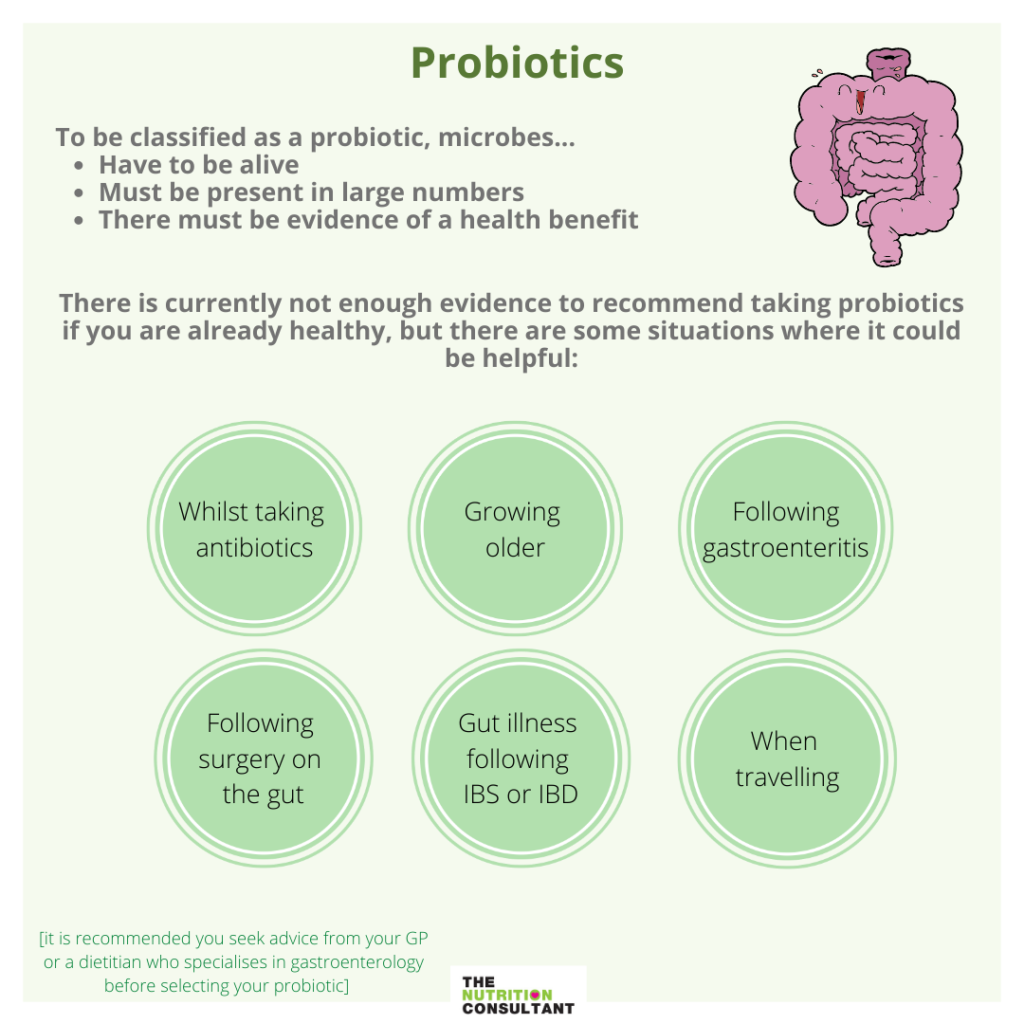
Which foods contain prebiotics?
Prebiotics are a type of undigestible fibre usually found in plant-based foods, which reach our large intestine, providing fuel for our beneficial bacteria, enabling them to thrive. This promotes a diverse and healthy balance of bacteria in our digestive system. They also contribute to healthy stools.
The main prebiotics that have been researched are inulin, fructo-oligosaccharides (FOS) and galacto-oligosaccharides (GOS) – these sound complex, but they’re just different types of carbohydrates which we can’t digest, making them perfect fuel to feed our good bacteria when they reach our large intestine. They’re found in common veg like onions, leeks and peas as well as foods you might eat less often such as Jerusalem artichokes, barley and chicory.
When looking at food labels, look out for ‘inulin’, ‘chicory’ (inulin’s food source) and FOS. It’s likely we’ll see more products containing these ingredients over the next few years, as food manufacturers try to make the most of their potential benefits. Top tip! – when increasing prebiotic-rich foods in your diet, do this gradually as drastic and sudden changes may lead to some undesirable gut symptoms! Check out the infographic for good food sources of prebiotics.
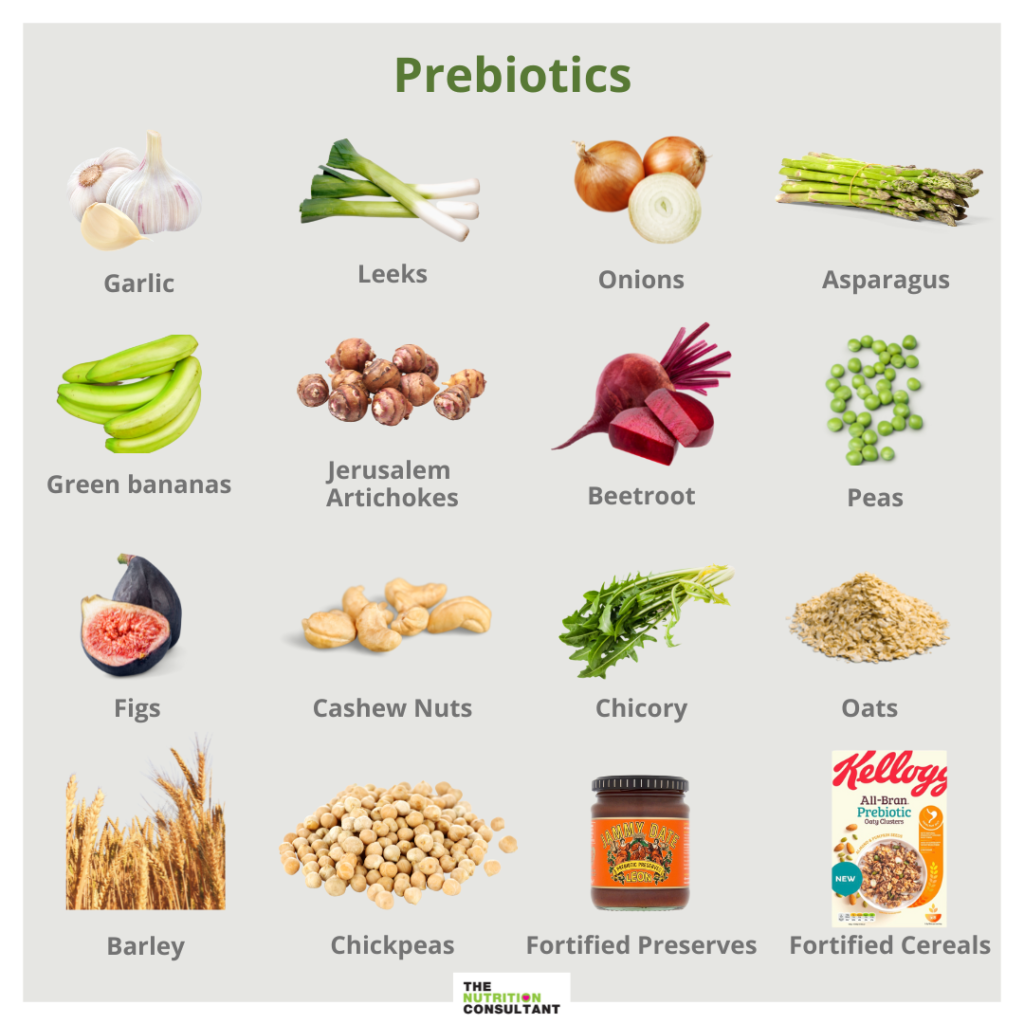
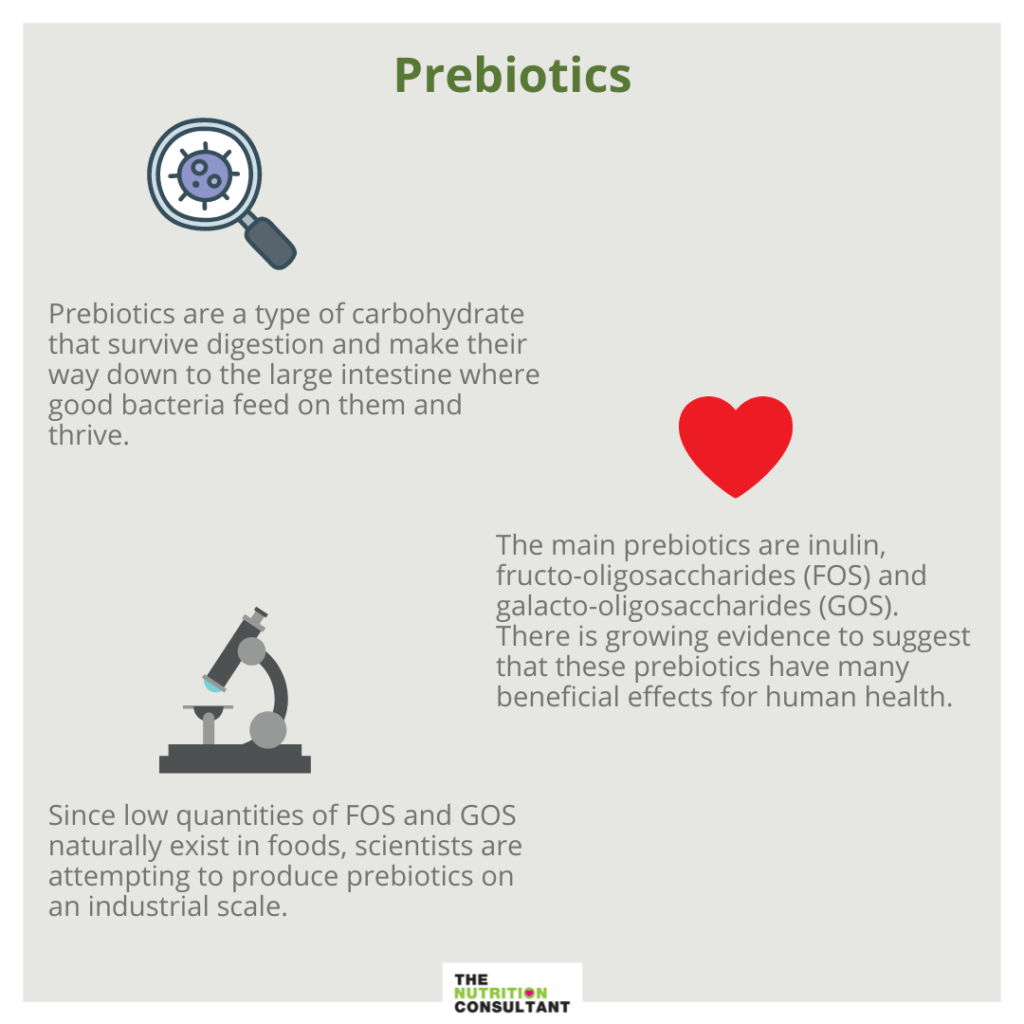
Should I take a prebiotic or probiotic supplement?
There is not enough evidence to recommend taking probiotic supplements if you are already healthy. There are however some situations where it could be helpful. These include:
?When taking antibiotics – These play an important role in fighting off infections, but they can disrupt the good bacteria as well as the bad, increasing the chances of having diarrhoea. Taking probiotics alongside antibiotics (and until a week after) can help protect you from this, especially if you are at high risk for antibiotic-associated diarrhoea.
?When travelling (particularly to less developed countries) – Taking a probiotic containing the bacteria Saccharomyces boulardii or a mixture of probiotics Lactobacillus acidophilus and Bifidobacterium bifidum for the entire holiday can help reduce the chance of picking up an infection.
?Gut disorders – Probiotics may also have a beneficial role in gut conditions such as IBS, as some studies suggest that they can help alleviate symptoms.
Different probiotics do different things and therefore have different justifications for use depending on the symptom or reason for probiotic use. If you fall into any of the above categories, it is recommended you seek advice from your GP or a dietitian specialising in gastroenterology before selecting your probiotic.
Unless you have a particular health condition, diagnosed by a Registered Dietitian or GP, and are recommended prebiotic supplements, its best to gradually increase prebiotic whole foods in your diet, to avoid any digestive discomfort.
How else can we support our immune system?
Of course, nutrition is not the only factor to influence the health of our immune system. Other ways you can support your immune health include getting at least 7 hours of sleep each night, not smoking, reducing alcohol consumption (as this also disrupts sleep), keeping active and minimising your stress levels. And to reduce risk of infection, keep up with your vaccinations and keep washing your hands regularly.
Summary
There are many interacting nutrients involved in the healthy functioning of your immune system, so optimising your overall diet to avoid deficiency is the best approach. The best way to do this is to follow the principles of the Eat Well Guide.
If you’re at risk of nutritional deficiencies because you exclude whole food groups, check out the advice above and take steps to increase intake of foods rich in these nutrients. If you’re concerned about your nutritional status, it might be worth consulting a Registered Dietitian or Nutritionist.
A healthy gut microbiome is thought to be central to a well-functioning immune system – currently a very active area of research. A diverse diet which is high in fibre and fruit and vegetables and low in ultra-processed foods is perhaps the best way to look after your gut health.
Nutrition is only one piece of jigsaw for good health, so its important to follow other healthy lifestyle habits too.
5 top tips for a healthy immune system
- Eat the rainbow – try to mix up your meals to include as much variety and colour as possible. Eating a diverse range of foods, especially fruit and vegetables will provide a wider range of micronutrients, reducing the risk of deficiency.
- Daily Vitamin D – make sure you and your family are taking a 10µg supplement every day during winter.
- Spot the gaps – if you’re vegan, vegetarian or exclude whole food groups, you are more at risk of micronutrient deficiencies, so try to assess where you might be lacking, or seek advice from a Registered Dietitian or Nutritionist.
- Look after your gut – try to include probiotic and prebiotic containing foods in your diet to improve the balance of your gut microbiota.
- Work/life balance – high stress levels and poor sleep amongst other lifestyle factors can negatively impact our immune function, so look after your mental as well as your physical well-being.
Blog compiled by Lucy Jessop, ANutr
This blog was compiled by Registered Associate Nutritionist and Food Writer, Lucy Jessop. You can find Lucy on Instagram @lucyjessopfood or via her website www.lucyjessop.co.uk.
References
- Maggini S, Pierre A, Calder PC. Immune function and micronutrient requirements change over the life course. Nutrients [Internet]. 2018 [cited 2022 Nov 30]; 10(10):1531. doi:10.3390/nu10101531
- Lanham-New SA, Webb AR, Cashman KD, et al. Vitamin D and SARS-CoV-2 virus/COVID-19 disease. BMJ Nutrition, Prevention & Health [Internet]. 2020 [cited 2022 Nov 30]; 3(1):106-110. doi:10.1136/bmjnph-2020-000089
- Vearing RM, Hart KH, Charlton K, Probst Y, Blackbourn DJ, Ahmadi KR, Lanham-New SA, Darling AL. Vitamin D Status of the British African-Caribbean Residents: Analysis of the UK Biobank Cohort. Nutrients [Internet]. 2021[cited 2022 Nov 30]; 13(11):4104. doi.org/10.3390/nu13114104
- Public Health England and Food Standards Agency. National Diet and Nutrition Survey Rolling Programme Years 9 to 11 (2016/2017 to 2018/2019) [Internet]. 2020 [cited 2022 Nov 30]. Available from: National Diet and Nutrition Survey (publishing.service.gov.uk)
- British Dietetic Association (2019) Folic Acid: food fact sheet. Available at: Folic Acid Food Fact Sheet (bda.uk.com) (Accessed: 30 Nov 2022).
- Zhang J, Saad R, Taylor EW, Rayman MP. Selenium and selenoproteins in viral infection with potential relevance to COVID-19. Redox Biology [Internet]. 2020 [cited 2022 Nov 30]; 37: 101715. doi: 10.1016/j.redox.2020.101715
- Moghaddam A, Heller RA, Sun Q, Seelig J, Cherkezov A, Seibert L, Hackler J, Seemann P, Diegmann J, Pilz M, Bachmann M, Minich WB, Schomburg L. Selenium deficiency is associated with mortality risk from covid-19. Nutrients [Internet]. 2020 [cited 2022 Nov 30]; 12(7):2098. doi.org/10.3390/nu12072098
- Wang Y et al. SARS-CoV-2 suppresses mRNA expression of selenoproteins associated with ferroptosis, endoplasmic reticulum stress and DNA synthesis. Food and Chemical Toxicology [Internet]. 2021 [cited 2022 Nov 30]; 153:112286. doi.org/10.1016/j.fct.2021.112286
- Rayman M, Taylor E, & Zhang J. The relevance of selenium to viral disease with special reference to SARS-CoV-2 and COVID-19. Proceedings of the Nutrition Society [Internet]. 2022 [cited 2022 Nov 30]; 1-12. doi:10.1017/S0029665122002646
- Broome CS, Mcardle F, Kyle JA, Andrews F, Lowe NM, Hart A, et al. An increase in selenium intake improves immune function and poliovirus handling in adults with marginal selenium status. Am J Clin Nutr. [Internet]. 2012 [cited 2022 Nov 30];80(1):154-62. doi: 10.1093/ajcn/80.1.154.
- National Institute of Health. Selenium – Health Professional Fact Sheet [internet]. 2021 [cited 2022 Nov 30]. Available from Selenium – Health Professional Fact Sheet (nih.gov)
- Rayman MP. Selenium and human health. Lancet [Internet]. 2012 [cited 2022 Nov 30]; 379:1256–68. DOI:10.1016/S0140- 6736(11)61452-9
- The British Dietetic Association. One Blue Dot Alternative Sources: Zinc. A practical guide for dietitians [internet]. 2018. [cited 2022 Nov 30]. Available from Practical-guide-other-sources-of-ZINC.pdf (bda.uk.com)
- Wiertsema SP, van Bergenhenegouwen J, Garssen J, Knippels LMJ. The interplay between the gut microbiome and the immune system in the context of infectious diseases throughout life and the role of nutrition in optimizing treatment strategies. Nutrients [Internet]. 2021 [cited 2022 Nov 30]; 13(3):886. doi.org/10.3390/nu13030886
- Butel M J.Probiotics, gut microbiota and health. Medecine et Maladies Infectieuses. [Internet]. 2014 [cited 2022 Nov 30];1–8. doi: 10.1016/j.medmal.2013.10.002.
- Frakolaki G, Giannour V, Kekos D. and Tzia C. A review of the microencapsulation techniques for the incorporation of probiotic bacteria in functional foods. Critical Reviews in Food Science and Nutrition [Internet]. 2020 [cited 2022 Nov 30]. Taylor and Francis Inc. doi: 10.1080/10408398.2020.1761773.
- Food and Agriculture Organisation of the United Nations(FAO), World Health Organisation (WHO) (2002) Guidelines for the evaluation of probiotics in food.Available at: Working Group Report21.PDF (who.int) (Accessed: 30th November 2022).
- Goodman, C., Keating, G., Georgousopoulou, E., Hespe, C. and Levett, K. (2021). Probiotics for the prevention of antibiotic-associated diarrhoea: a systematic review and meta-analysis. BMJ open, 11(8), p.e043054.
- McFarland, L.V. (2007). Meta-analysis of probiotics for the prevention of traveler’s diarrhea. Travel medicine and infectious disease, 5(2), pp.97-105.
- Didari, T., Mozaffari, S., Nikfar, S. and Abdollahi, M. (2015). Effectiveness of probiotics in irritable bowel syndrome: Updated systematic review with meta-analysis. World journal of gastroenterology: WJG, 21(10), p.3072.
